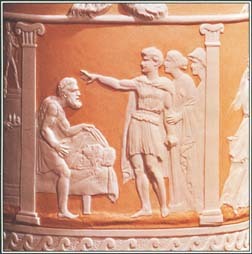Electra
In Greek mythology, there are two figures called Electra. The earlier Electra was one of seven daughters of the Titan Atlas* and Pleione. The seven sisters together were known as the Pleiades and eventually became a constellation, or group of stars, by the same name. According to the story, Electra was the mother of Dardanus, the founder of the city of Troy*. When the Greeks destroyed Troy during the Trojan War*, she left her place in the constellation to avoid seeing the city's destruction.
The second Electra appears in plays by the Greek writers Aeschylus, Sophocles*, and Euripides*. In their works, Electra was the daughter of Agamemnon, the leader of the Greeks in the Trojan War, and his wife, Clytemnestra. While Agamemnon was away at war, Clytemnestra took a lover named Aegisthus, and they plotted to murder Agamemnon when he returned. They also wanted to kill Orestes, Agamemnon's young son, but his sister Electra rescued him and sent him away to live in safety.
As an adult, Orestes returned home with his cousin Pylades to avenge his father's murder. Although Orestes disguised himself to enter the palace, Electra recognized him. She helped her brother and Pylades murder Clytemnestra and Aegisthus. It was said that Electra later married Pylades.
Titan one of a family of giants who ruled the earth until overthrown by the Greek gods of Olympus

Stories concerning Electra also appear in the play Mourning Becomes Electra, written by Eugene O'Neill in 1931, and the 1909 opera Elektra by Richard Strauss. In psychology, an "Electra complex" refers to a woman whose unresolved love for her father harms her relationships with other men.
See also Agamemnon ; Clytemnestra ; Orestes ; Pleiades .